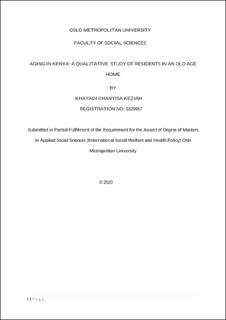Aging in Kenya: A qualitative study of the residents in old age home
Master thesis
Published version
Permanent lenke
https://hdl.handle.net/11250/2755417Utgivelsesdato
2020Metadata
Vis full innførselSamlinger
Sammendrag
The study aimed at assessing the attitudes and perceptions of the elderly regarding the elderly homes. The specific emphasis was on understanding the elder persons perceptions, and adaptive strategies in the elderly homes. This resonated from the meanings they have towards the elderly home and the reasons for their stay there. A total of sixteen (16) respondents were selected for interviews using snowball sampling approach and the study area was Cheshire home for the elderly in Nairobi County, Kenya. Qualitative design was used in this study and in-depth interview was used as a data collection method. The disengagement and continuity theory were used as a theoretical framework.
The findings indicate that most elderly attribute their stay at the home to poor health, family alienation, poverty, and changes in the traditional care systems.
The results show that the attitudes of the elderly regarding the elderly homes differed although majority expressed gratitude and happiness for being here. The level of disengagement and continuity also differed among the residents but most skewed towards disengagement for various reasons they gave for their stay here, such as poor health, family alienation, poverty and the elderly home itself being a disengagement factor. However, some aspects such as Religion gave majority of them a sense of continuity and solace towards old age.
The strategies the elderly use to cope with old age and the new environment at the home include establishing new relationship with each other, and the staff, to fill in for the missing family structures they lost. They also attributed religion as part of their coping strategy.
